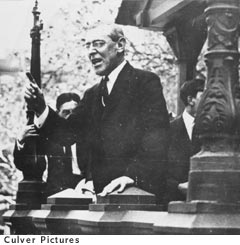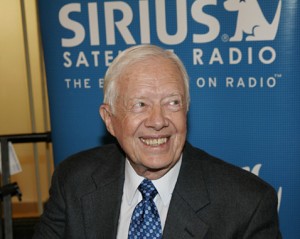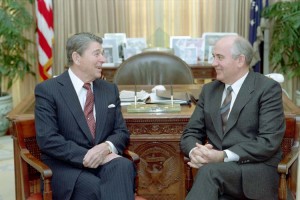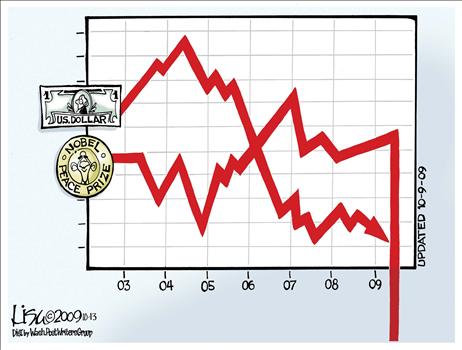It’s now official. The Nobel Peace Prize has lost all remnants of credibility. Not that it had much to begin with, but the bestowal of this award on Barack Obama has made it clear that a person doesn’t have to do anything to win it. Well, talking a lot and apologizing for one’s country might help, but it isn’t mandatory. This is even worse than Al Gore’s Nobel Peace Prize in 2007. It’s now obvious that celebrity is the benchmark for choosing a winner. We’ve gone from the Guru of Global Warming to the One who shall be the Political Messiah.
What we need to understand is that we are viewing how the world works within the closed community of liberal politics and academia. It has little to do with the real world, but it does make a splash. After all, a peace prize has a nice ring to it. Stalin used to offer one. That says it all.
Obama is the fourth president to have received this honor. Let’s look at who the others were and why they won it.
 Theodore Roosevelt was one of the first recipients of the Nobel Peace Prize. He won it in 1906 for his part as a mediator in the Russo-Japanese War. That sounds impressive, but his role didn’t come about on his own initiative. The Russians were being beaten badly and were seeking a face-saving way out of the conflict. They sought out a mediator and settled on Roosevelt.
Theodore Roosevelt was one of the first recipients of the Nobel Peace Prize. He won it in 1906 for his part as a mediator in the Russo-Japanese War. That sounds impressive, but his role didn’t come about on his own initiative. The Russians were being beaten badly and were seeking a face-saving way out of the conflict. They sought out a mediator and settled on Roosevelt.
He brought over the diplomats to the United States, and they (the diplomats) hammered out an agreement to end the war. To a great extent, Roosevelt’s role was as a figurehead.
Yet it was good enough to win the Nobel Peace Prize.
 Woodrow Wilson desired to emulate Roosevelt and win his own Nobel. With World War I grinding to a stalemate, Wilson hoped he would be called upon to mediate. He never got the call. Instead, the U.S. ended up in that war. Wilson went to Versailles after the war to try to impose his 14 Points on the allies. They rebuffed all his ideas except for the establishment of the League of Nations. So, in 1919, the Nobel committee concluded that his League of Nations idea earned him the nod as the Peace Prize winner.
Woodrow Wilson desired to emulate Roosevelt and win his own Nobel. With World War I grinding to a stalemate, Wilson hoped he would be called upon to mediate. He never got the call. Instead, the U.S. ended up in that war. Wilson went to Versailles after the war to try to impose his 14 Points on the allies. They rebuffed all his ideas except for the establishment of the League of Nations. So, in 1919, the Nobel committee concluded that his League of Nations idea earned him the nod as the Peace Prize winner.
Ironically, the U.S. never ratified the treaty that included the League, so we weren’t even a part of it. Further, it was a total flop: it didn’t prevent any wars and died a slow death, finally killing itself on the pike of World War II. Its demise was lamented by no one. So was that really worth the Nobel Peace Prize?
 The other president who won the prize didn’t get it until long after he left office. Jimmy Carter received the honor in 2002. So what did he do in that year to earn it? Was it for work on Habitat for Humanity? Did he mediate a war? In fact, the secret that wasn’t really a secret is that he won simply because he stood against the policies of George W. Bush. In other words, the award that year was meant as a slap in the face to the sitting U.S. president.
The other president who won the prize didn’t get it until long after he left office. Jimmy Carter received the honor in 2002. So what did he do in that year to earn it? Was it for work on Habitat for Humanity? Did he mediate a war? In fact, the secret that wasn’t really a secret is that he won simply because he stood against the policies of George W. Bush. In other words, the award that year was meant as a slap in the face to the sitting U.S. president.
Interestingly, former Palestinian leader/terrorist Yasser Arafat was another Peace Prize winner.
 One president who missed out on the prize was Ronald Reagan. Yet in 1990, one year after Reagan left office, Mikhail Gorbachev was the recipient. How ironic.
One president who missed out on the prize was Ronald Reagan. Yet in 1990, one year after Reagan left office, Mikhail Gorbachev was the recipient. How ironic.
Gorbachev, during the Reagan years, superintended a tottering empire. The Soviet Union, nearly bankrupt, was in a state of confusion and panic. Gorbachev’s solution was to try to save socialism by tinkering with the system a bit, then reach out to Western nations for funds to keep the decrepit state he inherited from collapsing completely. He didn’t succeed.
Reagan, on the other hand, was the architect of the Soviet Union’s downfall. He waged economic war on the evil empire throughout his administration, helping to bankrupt it so it would no longer be a threat to world peace. He succeeded. And yet he was passed over by the insulated community of liberal activists, and they chose to honor Gorbachev instead.
This little history lesson was designed to reveal that the Nobel Peace Prize has been a rather cheap prize for quite some time. The award this year simply makes it cheaper.

